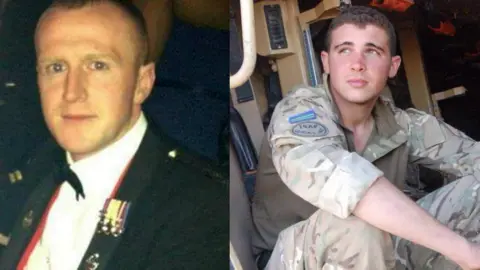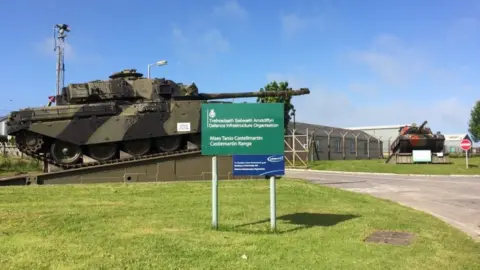Castlemartin inquest hears blast was first of its kind
 Wales News Service
Wales News ServiceAn explosion that killed two soldiers in a British Army tank had never happened in the history of the model's 20 year service, an inquest was told.
Royal Tank Regiment corporals Matthew Hatfield, 27, and Darren Neilson, 31, died in the blast in Castlemartin, Pembrokeshire, in June 2017.
A seal to stop explosive gases escaping into the crew turret of the tank was not in place, the inquest heard.
Two other soldiers survived the blast with injuries.
Army training officer Sergeant Alexander Ahtom told the hearing he was "not aware of any former incident like this before" and he "never thought it possible".
Even during high-tempo combat operations in Iraq, this type of incident had never occurred, the inquest heard on Tuesday.

But the tank specialist agreed with Senior Coroner for Birmingham and Solihul, Louise Hunt, that a "misunderstanding" was possible when a new crew took over a tank.
Both Cpl Neilson, a father of one from Preston, and Cpl Hatfield from Wiltshire, were highly-trained gunnery instructors and were taking a soldier out on a "guest shoot", the inquest heard.
Their tank had been used by a previous crew earlier that morning, before the four soldiers took it to the firing area in the afternoon.
The bolt vent axial (BVA) seal was not present and ammunition may have been "incorrectly stowed", the inquest was told.
Sgt Ahtom said there was no regulation in place to recheck the Challenger 2 tank barrels after use, but "absolutely no-one" raised this circumstance as a concern.
But in the previous six weeks, training procedures were changing to include a frequent gun-proving drill, which rechecked the tank barrel and the BVA seal, the inquest heard.
'Direct action in Iraq'
Sgt Ahtom told senior coroner Ms Hunt that he was "concerned" that people were not doing the gun-proving drill as expected.
Simon Antrobus QC, representing tank-maker BAE, said that "a whole series of rigorous development trials to look at reliability, firing and manoeuvres" had been conducted.
"During which thousands of rounds were fired and it saw direct action in Iraq against Iraqi tanks," he added.
Sgt Ahtom also said that he "completely" disagreed with the Ministry of Defence (MoD) joint service inquiry panel's conclusion into the blast.
The panel proposed that it could be possible to miss that the airtight seal was not present if checking for another key part.
The inquest, which is set to last three weeks, continues.